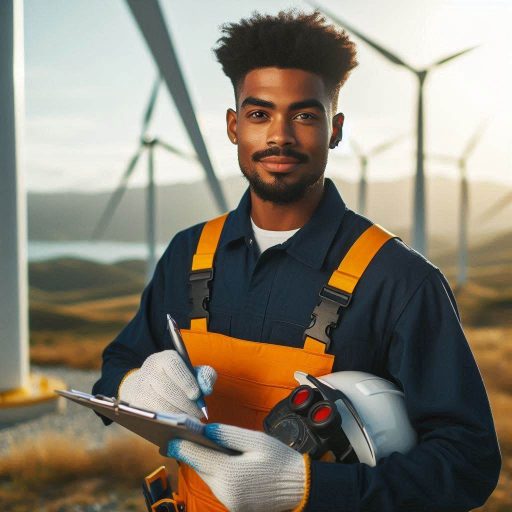Introduction
Solar PV installers play a crucial role in the renewable energy industry.
Their expertise directly contributes to the expansion of solar power.
As the world shifts towards greener energy solutions, the demand for solar PV installers has surged.
This rapid growth in renewable energy sources, particularly solar power, highlights their importance.
The rise of solar power is transforming the energy landscape.
With increasing environmental concerns, renewable sources are gaining momentum.
Solar power stands out as a key player in this transition.
As technology advances and costs decrease, more individuals and businesses are adopting solar energy.
This widespread adoption accelerates the need for skilled solar PV installers.
In recent years, solar power capacity has expanded significantly.
Countries worldwide are setting ambitious goals for renewable energy.
Solar PV installers are at the forefront of achieving these goals.
Their work ensures that solar panels are properly installed and maintained, optimizing energy production.
This blog post aims to explore the impact of solar PV installers on renewable energy growth.
We will examine how their role supports the broader transition to clean energy.
Additionally, we will discuss the challenges they face and the opportunities that arise from this expanding field.
Overview of Solar PV Installers
Define What Solar PV Installers Do
Solar PV installers are professionals who specialize in setting up and maintaining solar photovoltaic systems.
They install solar panels, connect electrical components, and ensure systems operate efficiently.
Their work includes assessing site conditions, mounting panels, and integrating systems with existing power grids.
Installers also handle routine maintenance to ensure optimal system performance and longevity.
The Importance of Their Role in the Adoption of Solar Energy
Solar PV installers play a crucial role in expanding the adoption of solar energy.
Without their expertise, the deployment of solar systems would be slow and inefficient.
They help make solar energy more accessible by ensuring installations are performed correctly.
This efficiency boosts confidence in solar technology and encourages more individuals and businesses to switch to renewable energy sources.
Their work directly contributes to reducing greenhouse gas emissions and advancing global sustainability goals.
The Skills and Qualifications Required to Become a Solar PV Installer
To become a solar PV installer, several skills and qualifications are necessary.
A solid understanding of electrical systems and solar technology is essential.
Installers must be proficient in reading technical diagrams and troubleshooting issues.
Physical fitness and manual dexterity are also important due to the hands-on nature of the job.
Formal education in electrical engineering or renewable energy technology is often required, along with specialized training programs or apprenticeships.
Certification from industry bodies enhances job prospects and credibility.
Additionally, good communication and customer service skills are valuable for interacting with clients and addressing their concerns.
In summary, solar PV installers are vital to the growth of renewable energy.
Their expertise ensures efficient installation and maintenance of solar systems, promoting wider adoption of solar technology.
With the right skills, qualifications, and hands-on experience, they support the transition to a sustainable energy future and contribute to achieving global climate goals.
Contribution to Renewable Energy Growth
How Solar PV Installers Play a Key Role in the Growth of Renewable Energy
Solar PV installers are vital to the expansion of renewable energy.
They ensure the successful deployment of solar photovoltaic (PV) systems, making solar power more accessible.
Their expertise is crucial for optimizing the performance and efficiency of solar panels.
By providing skilled installation services, these professionals facilitate the widespread adoption of solar energy, contributing significantly to the growth of renewable energy.
Statistics or Case Studies Showing the Impact of Solar PV Installers on the Increase of Solar Energy Installations
Recent statistics underscore the impact of solar PV installers.
According to the Solar Energy Industries Association, solar installations in the U.S.
surged by over 30% from 2021 to 2022.
This growth is a direct result of the efforts of skilled solar PV installers.
Case studies also highlight their impact.
For instance, in California, solar PV installers were instrumental in achieving over 30 gigawatts of installed solar capacity by 2023.
This milestone reflects the dedication and expertise of local installers who have expanded the state‘s solar energy infrastructure.
The Economic Benefits of Investing in Solar PV Installers for Renewable Energy Growth
Investing in solar PV installers offers significant economic benefits.
Firstly, the solar industry has created over 300,000 jobs in the U.S.
by the end of 2022, with many positions filled by installers.
This job creation is a direct result of increased solar installations driven by these professionals.
Additionally, solar PV installations lead to long-term cost savings for homeowners and businesses.
Reduced energy bills and lower maintenance costs make solar power a financially attractive option.
As solar technology becomes more widespread, the cost of installations decreases due to economies of scale.
This reduction in cost further makes solar energy more accessible and affordable.
Overall, investing in solar PV installers not only supports the growth of renewable energy but also contributes to economic development and cost savings.
Read: Radiologic Technologist: Work Environment Insights
Challenges Faced by Solar PV Installers
Common Challenges Faced by Solar PV Installers in Their Work
Solar photovoltaic (PV) installers play a crucial role in advancing renewable energy.
However, they encounter several challenges that impact their work and the industry’s growth.
Recognizing these challenges is the first step in addressing them effectively.
Factors Such as Regulatory Issues, Competition, and Lack of Training Opportunities
Regulatory issues present a significant challenge for solar PV installers.
Regulations vary by region and can be complex.
Installers often struggle to stay updated, which can delay projects and increase costs.
Navigating these regulations requires both time and expertise, and often results in unexpected hurdles during installations.
Competition in the solar PV market also affects installers.
As the industry expands, more companies enter the market, intensifying competition.
This competition can lead to reduced profit margins and price wars, which may compromise service quality.
Installers must find ways to distinguish themselves from competitors to maintain a strong market presence.
Another key factor is the lack of training opportunities.
The solar industry is rapidly evolving, with new technologies and techniques emerging frequently.
Many installers face difficulties keeping their skills current due to insufficient training resources.
This lack of ongoing education can hinder their ability to offer the latest and most efficient solutions to clients.
Suggest Possible Solutions to Address These Challenges and Support Solar PV Installers
To tackle regulatory issues, industry associations should collaborate with policymakers to simplify and standardize regulations.
Clear guidelines and streamlined processes can help installers navigate regulations more efficiently, reducing project delays and costs.
Providing training sessions focused on regulatory compliance can also assist installers in staying informed.
Addressing competition requires a focus on differentiation.
Solar companies should emphasize quality, innovation, and exceptional customer service.
Building strong relationships with clients and offering comprehensive support can help companies stand out.
Investing in marketing strategies and showcasing successful projects can also enhance a company’s reputation.
For the lack of training opportunities, industry leaders should invest in developing and expanding training programs.
Offering certifications, workshops, and hands-on training can help installers stay updated on the latest technologies and techniques.
Collaboration between educational institutions and solar companies can facilitate the creation of effective training programs.
Improving financial barriers involves offering diverse financing options and incentives.
Solar companies can work with financial institutions to provide flexible payment plans and leasing options for customers.
Government subsidies and rebates can also play a crucial role in making solar installations more affordable for both installers and clients.
Lastly, addressing logistical issues can improve efficiency.
Implementing advanced project management tools and communication strategies can streamline coordination among stakeholders.
Ensuring timely delivery of materials and clear communication with clients can help reduce delays and improve project outcomes.
Basically, solar PV installers face challenges such as regulatory issues, competition, and a lack of training opportunities.
By addressing these challenges through streamlined regulations, enhanced training, and improved financial incentives.
The solar industry can support installers and foster continued growth in renewable energy.
Read: Best Online Courses for CAD Technician Training
Training and Education for Solar PV Installers
The Importance of Proper Training and Education for Solar PV Installers
Proper training and education are vital for solar PV installers to ensure the safe and effective installation of solar systems.
With renewable energy on the rise, the demand for skilled solar PV installers is growing rapidly.
Well-trained professionals are essential to maintaining industry standards and delivering high-quality installations that contribute to the success of solar energy projects.
The Available Training Programs, Certifications, and Industry Standards for Solar PV Installers
Training programs for solar PV installers are designed to equip individuals with the knowledge and skills needed for the job.
These programs cover various aspects, including electrical systems, safety protocols, and installation techniques.
Through hands-on experience, trainees learn to handle tools and materials, ensuring they can perform installations confidently and accurately.
Certifications play a crucial role in the solar industry, as they validate an installer’s expertise and adherence to industry standards.
The North American Board of Certified Energy Practitioners (NABCEP) offers one of the most recognized certifications in the field.
This certification requires passing a rigorous exam that tests knowledge of PV systems, codes, and safety practices.
Achieving NABCEP certification signals a high level of competence and commitment to quality.
Industry standards, such as those set by the Occupational Safety and Health Administration (OSHA), are also integral to the training of solar PV installers.
These standards ensure that installations meet safety regulations and reduce the risk of accidents.
Proper education on these standards helps installers to work safely and efficiently, minimizing potential hazards.
Provide Resources for Individuals Interested in Pursuing a Career as a Solar PV Installer
For individuals interested in pursuing a career as a solar PV installer, there are numerous resources available.
Community colleges and vocational schools offer training programs that provide both theoretical knowledge and practical skills.
These programs often include internships or apprenticeships, allowing students to gain real-world experience under the supervision of experienced professionals.
Online courses and workshops are another valuable resource for those seeking to enter the solar PV industry.
Platforms like Solar Energy International (SEI) offer comprehensive online training programs that cover everything from basic principles to advanced installation techniques.
These courses allow students to learn at their own pace while gaining the necessary skills to succeed in the field.
Networking with professionals in the solar industry can also be beneficial for aspiring installers.
Attending industry conferences, joining trade associations, and participating in online forums can help individuals stay updated on the latest trends and technologies.
These connections can lead to job opportunities, mentorship, and access to further training.
In a nutshell, proper training and education are crucial for solar PV installers to thrive in the growing renewable energy sector.
With a variety of training programs, certifications, and resources available, individuals can gain the skills and knowledge needed to succeed.
By pursuing education and staying informed about industry standards, aspiring solar PV installers can contribute to the expansion of renewable energy.
Read: Common Mistakes in Quality Control Inspections

Innovation in Solar PV Installation
Explore the Latest Trends and Innovations in Solar PV Installation Technology
Innovation in solar PV installation is driving significant advancements in renewable energy growth.
The latest trends in solar panel design and installation techniques are revolutionizing the industry.
High-efficiency solar panels, bifacial panels, prefabricated solar kits, and advanced mounting systems are just a few examples of the innovations shaping the future of solar energy.
These advancements are not only improving the efficiency of solar power generation but also making it more accessible and affordable for a broader audience.
How Advancements in Solar Panel Design and Installation Techniques Are Impacting the Work of Solar PV Installers
Solar PV installers are at the forefront of deploying these cutting-edge technologies.
High-efficiency and bifacial solar panels capture more sunlight and convert it into electricity with greater efficiency.
These advancements require installers to adapt their techniques to ensure optimal performance.
The use of prefabricated solar kits and advanced mounting systems is reducing installation time and costs, making the work of installers more efficient.
Drones for site assessment and smart inverters for energy management further enhance the precision and effectiveness of solar installations.
These technological advancements are reshaping the role of solar PV installers, requiring them to continuously update their skills and knowledge.
The Role of Solar PV Installers in Adopting and Implementing New Technologies to Improve Renewable Energy Growth
Solar PV installers play a crucial role in adopting and implementing new technologies, driving the expansion of renewable energy.
They are the link between innovative solar technologies and their practical application in the real world.
By mastering the latest trends and advancements, installers ensure that solar systems are more efficient, reliable, and easier to install.
Their expertise in integrating new technologies like high-efficiency panels, smart inverters, and energy storage solutions is essential for maximizing the benefits of solar power.
As they continue to embrace innovation, solar PV installers are driving the growth of renewable energy, making solar power a more viable and widespread solution for energy needs.
Transform Your Career Today
Unlock a personalized career strategy that drives real results. Get tailored advice and a roadmap designed just for you.
Start NowRead: Quality Control Inspector: Entry-Level Guide
Environmental Impact of Solar PV Installers
The environmental benefits of solar PV installations
Solar PV installations offer significant environmental benefits by reducing dependence on fossil fuels.
Solar panels generate clean energy, free of harmful emissions, unlike traditional power sources.
This clean energy helps lower air pollution, a major concern in urban areas.
Solar energy systems also use minimal water for maintenance, unlike conventional power plants that consume large amounts of water for cooling.
This water-saving feature is especially beneficial in drought-prone regions.
Each installation contributes to a sustainable energy future by promoting renewable resources over non-renewable ones.
How solar PV installers contribute to reducing carbon emissions and combating climate change
Solar PV installers play a vital role in combating climate change by facilitating the shift to renewable energy.
By installing solar panels, they enable homes, businesses, and industries to reduce their reliance on fossil fuels.
The energy generated by these solar panels displaces energy that would otherwise come from coal, oil, or gas.
This displacement leads to a significant reduction in carbon dioxide emissions, which are the primary cause of global warming.
Every megawatt-hour of solar energy produced prevents approximately one ton of carbon dioxide from entering the atmosphere.
The potential for solar PV installers to further enhance environmental sustainability in the future
The potential for solar PV installers to enhance environmental sustainability in the future is vast.
As solar technology advances, the efficiency of solar panels continues to improve, allowing for more energy production from smaller installations.
This improvement enables solar PV installers to optimize space and resources, further reducing environmental impacts.
Innovations such as energy storage systems and smart grid connections will make solar energy more efficient and reliable.
Solar PV installers are at the forefront of these technological advancements, ensuring that solar energy continues to be a key player in reducing our environmental footprint.
In essence, solar PV installers are crucial in driving renewable energy growth and reducing carbon emissions.
Their work not only brings immediate environmental benefits but also holds the potential to further enhance sustainability in the future.
As the world continues to seek solutions to combat climate change, the role of solar PV installers will become increasingly important in building a sustainable energy future
Gain More Insights: Educational Path for Transportation Engineers
Conclusion
Solar PV installers play a crucial role in driving renewable energy growth.
They are the backbone of the solar industry, ensuring that solar panels are correctly installed and functioning optimally.
By converting sunlight into electricity, they contribute directly to reducing reliance on fossil fuels and lowering greenhouse gas emissions.
Their work accelerates the adoption of clean energy, making them essential to achieving global sustainability goals.
The need for continued support and investment in solar PV installers cannot be overstated.
As the demand for renewable energy increases, so does the need for skilled professionals who can meet the installation demands.
Investing in their training and development ensures that the solar industry continues to expand.
This growth not only creates jobs but also fosters innovation in solar technology, leading to more efficient and cost-effective solutions.
Governments, businesses, and individuals must prioritize support for these installers to sustain the momentum toward a greener future.




